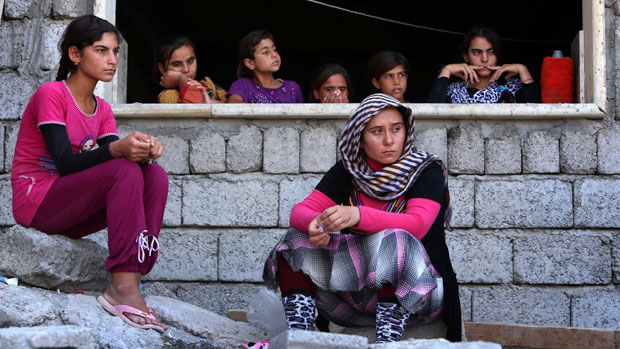Yazidis: who are they and why is Islamic State pursuing them?
One of Iraq's oldest and most persecuted religious minorities, the Yazidi faces yet another genocide

A free daily email with the biggest news stories of the day – and the best features from TheWeek.com
You are now subscribed
Your newsletter sign-up was successful
Over 40,000 Yazidis remain trapped on Mount Sinjar in Northern Iraq, awaiting humanitarian aid and military intervention against Islamic State militants that could "help prevent genocide".
Earlier this week, a Yazidi member of parliament in Baghdad made a tearful and passionate appeal on behalf of her people, begging the government to intervene. "An entire religion is being exterminated from the face of the Earth," she said.
As one of the world's "forgotten communities" waits to be rescued, we look at this deeply misunderstood religious group and why they have been so ruthlessly persecuted.
The Week
Escape your echo chamber. Get the facts behind the news, plus analysis from multiple perspectives.

Sign up for The Week's Free Newsletters
From our morning news briefing to a weekly Good News Newsletter, get the best of The Week delivered directly to your inbox.
From our morning news briefing to a weekly Good News Newsletter, get the best of The Week delivered directly to your inbox.
Who are the Yazidis?
Yazidis, most of whom are ethnic Kurds, are one of Iraq's oldest religious minorities. They have been often been persecuted and threatened with extermination: the Yazidis survived 72 separate genocides under the Ottoman Empire, the New York Times reports and were ruthlessly targeted under Saddam Hussein's regime. How many of them exist?Estimates vary but there are believed to be about 300,000 of them within Iraq. Many more live across the broad region of Turkey, Syria and Iran, with an estimated global population of 700,000. Yazidis consider Northern Iraq, particularly areas near the besieged city of Mosul, to be their historic homeland. The rise of Islamic extremism in the Middle East forced many to flee to Europe, Cale Salih writes in the New York Times. What do they believe?Described as "one of the most eclectic of faiths", Yazidi's posses an unusual fusion of diverse religious beliefs from Christianity and Islam and Zoroastrianism – one of the oldest religions in the word. They combine elements from Christianity such as baptism, and others, such as circumcision, from Islam. They follow a supreme being known as Yasdan, as well as seven holy spirits or angels, and believe in reincarnation. Like many other small religions in the region, outsiders are not allowed to convert to Yazidism. Followers of this monotheistic religion have historically been mislabelled as devil worshippers due to the veneration of a "fallen angel", one of the reasons they face such persecution. What are they being targeted by Islamic State?They have been labelled infidels, or non-believers by many fundamentalist groups including the Islamic State and its predecessor Al-Qaeda. Islamic State is fighting for an Islamic caliphate and has been violently targeting other religious groups to choose between forced conversion to Islam or execution. The extremists appear "bent on ethnic cleansing", Ishaan Tharoor writes in the Washington Post.
"Everyone considers us infidels," said Samir Babasheikh, son of Baba Sheikh, the Yazidis' spiritual leader. "Sunnis and Shiites are killing each other even though they are both Muslims, so imagine what they will do to us, people from a completely different religion."
A free daily email with the biggest news stories of the day – and the best features from TheWeek.com
-
 Democrats push for ICE accountability
Democrats push for ICE accountabilityFeature U.S. citizens shot and violently detained by immigration agents testify at Capitol Hill hearing
-
 The price of sporting glory
The price of sporting gloryFeature The Milan-Cortina Winter Olympics kicked off this week. Will Italy regret playing host?
-
 Fulton County: A dress rehearsal for election theft?
Fulton County: A dress rehearsal for election theft?Feature Director of National Intelligence Tulsi Gabbard is Trump's de facto ‘voter fraud’ czar
-
 Epstein files topple law CEO, roil UK government
Epstein files topple law CEO, roil UK governmentSpeed Read Peter Mandelson, Britain’s former ambassador to the US, is caught up in the scandal
-
 Iran and US prepare to meet after skirmishes
Iran and US prepare to meet after skirmishesSpeed Read The incident comes amid heightened tensions in the Middle East
-
 Israel retrieves final hostage’s body from Gaza
Israel retrieves final hostage’s body from GazaSpeed Read The 24-year-old police officer was killed during the initial Hamas attack
-
 China’s Xi targets top general in growing purge
China’s Xi targets top general in growing purgeSpeed Read Zhang Youxia is being investigated over ‘grave violations’ of the law
-
 Panama and Canada are negotiating over a crucial copper mine
Panama and Canada are negotiating over a crucial copper mineIn the Spotlight Panama is set to make a final decision on the mine this summer
-
 Why Greenland’s natural resources are nearly impossible to mine
Why Greenland’s natural resources are nearly impossible to mineThe Explainer The country’s natural landscape makes the task extremely difficult
-
 Iran cuts internet as protests escalate
Iran cuts internet as protests escalateSpeed Reada Government buildings across the country have been set on fire
-
 US nabs ‘shadow’ tanker claimed by Russia
US nabs ‘shadow’ tanker claimed by RussiaSpeed Read The ship was one of two vessels seized by the US military